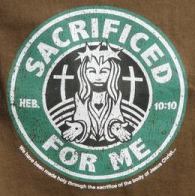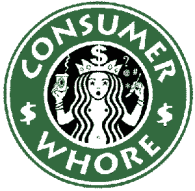 On Sept. 21, the Seattle Post-Intelligencer ran a story about a Christian-themed clothier selling T-shirts and caps with a Christian spin on Starbucks’ familiar logo. It replaces the siren with Jesus and the words “Starbucks Coffee” with “Sacrificed for Me.” It only comes in one color: coffee. It’s available locally for $14.99 at a Shell gas station in Seattle’s Queen Anne Hill neighborhood, and on the Internet at www.christiantshirts.com and www.JesusHats.com.
On Sept. 21, the Seattle Post-Intelligencer ran a story about a Christian-themed clothier selling T-shirts and caps with a Christian spin on Starbucks’ familiar logo. It replaces the siren with Jesus and the words “Starbucks Coffee” with “Sacrificed for Me.” It only comes in one color: coffee. It’s available locally for $14.99 at a Shell gas station in Seattle’s Queen Anne Hill neighborhood, and on the Internet at www.christiantshirts.com and www.JesusHats.com.
The maker, Berryville, Ark.-based Kerusso, is the nation’s largest Christian-themed apparel company. Kerusso told the P-I: “It’s interesting how many of our parodies do end up as best-sellers. I think people like the fact that they can get a little chuckle out of something and at the same time express their faith.”


Parody or infringement?
Kerusso’s (left) and Kieron Dwyer’s adaptations
While it may be a best seller, is it really parody? If so, it’s protected as free speech. If not, it’s trading on Starbucks’ goodwill. In the Ninth Circuit, “a true parody will be so obvious that a clear distinction is preserved between the source of the target and the source of the parody….” Dr. Seuss Enterprises, L.P. v. Penguin Books USA, Inc., 109 F.3d 1394, 1405 (9th Cir. 1997). Moreover, “[t]he claim of parody is no defense ‘where the purpose of the similarity is to capitalize on a famous mark’s popularity for the defendant’s own commercial use.’” Id. at 1406, quoting Hard Rock Cafe Licensing Corp. v. Pacific Graphics, Inc., 776 F.Supp. 1454, 1462 (W.D.Wash.1991).
As the Ninth Circuit later explained, “the book The Cat NOT in the Hat! borrowed Dr. Seuss’s trademarks and lyrics to get attention rather than to mock The Cat in the Hat! The defendant’s use of the Dr. Seuss trademarks and copyrighted works had no critical bearing on the substance or style of The Cat in the Hat!, and therefore could not claim First Amendment protection. Dr. Seuss recognized that, where an artistic work targets the original and does not merely borrow another’s property to get attention, First Amendment interests weigh more heavily in the balance.” Mattel, Inc. v. MCA Records, Inc., 296 F.3d 894, 901 (9th Cir. 2002).
Given these authorities, Kerusso’s use of Starbucks’ mark appears mainly to get attention. It does not mock Starbucks or offer any comment on the company the mark represents; it merely makes use of the company’s familar trademark. Therefore, it probably is infringing (and dilutive) use.
A closer case occurred a few years ago when artist Kieron Dwyer sold T-shirts with a logo that replaced “Starbucks Coffee” with “Consumer Whore,” added dollar signs, and gave the mermaid a cell phone. That adaptation would seem to offer plenty of commentary about Starbucks. The Northern District of California, however, begged to differ and imposed a preliminary injunction against Mr. Dwyer. The case later settled.
Starbucks should be on solid ground to obtain similar relief against Kerusso.